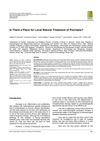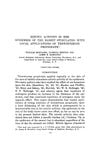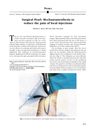 January 2020 in “Research Square (Research Square)”
January 2020 in “Research Square (Research Square)” Stress hormone CRF causes hair loss and stops hair cell growth.
10 citations,
February 2017 in “European journal of neuroscience/EJN. European journal of neuroscience” The availability of certain hormones and specific stimulation patterns affect long-term synaptic changes in the male rat brain.
 5 citations,
October 2013 in “Clinics in Plastic Surgery”
5 citations,
October 2013 in “Clinics in Plastic Surgery” Hair transplant improves with regenerative medicine and FUE technique.
 4 citations,
September 2014 in “Elsevier eBooks”
4 citations,
September 2014 in “Elsevier eBooks” Use some skin medications with caution during pregnancy; avoid strong steroids, certain eczema treatments, and systemic retinoids, but many topical treatments and nasal sprays are safe.
4 citations,
February 1953 in “Experimental biology and medicine” Adrenocortical extract is less effective at stopping hair growth in young rats than in adult rats.
2 citations,
December 2015 in “Journal of dermatology” β-interferon injections for melanoma can cause excessive hair growth at the injection sites.
 January 2024 in “Jurnal Ilmu Kesehatan Hewan”
January 2024 in “Jurnal Ilmu Kesehatan Hewan” The dog recovered well after treatment, showing no skin issues and normal hair growth.
 October 2023 in “Jurnal Ilmu Kesehatan Hewan”
October 2023 in “Jurnal Ilmu Kesehatan Hewan” The kitten's skin condition improved significantly after 4 weeks of treatment.
 August 2018 in “Journal of The American Academy of Dermatology”
August 2018 in “Journal of The American Academy of Dermatology” The moisturizing cream used after a chemical peel was well tolerated and effectively moisturized the skin.
 October 2013 in “Journal of Medicinal Plants Research”
October 2013 in “Journal of Medicinal Plants Research” The herbal cleanser increased hair growth in rats without harming their skin.
 November 2013 in “Journal of Mazandaran University of Medical Sciences”
November 2013 in “Journal of Mazandaran University of Medical Sciences” Minoxidil with caffeine works better for hair loss than minoxidil alone.
37 citations,
October 2017 in “Saudi pharmaceutical journal” All evaluated shampoos meet Saudi standards.
 16 citations,
April 2018 in “Animal Genetics”
16 citations,
April 2018 in “Animal Genetics” Researchers found two genes that may explain why some Casertana pigs don't have hair.
 15 citations,
May 2018 in “Open Access Macedonian Journal of Medical Sciences”
15 citations,
May 2018 in “Open Access Macedonian Journal of Medical Sciences” Propolis and aloe vera ointment effectively treats mild to moderate psoriasis.
 2 citations,
May 2022 in “Ethnobotany research and applications”
2 citations,
May 2022 in “Ethnobotany research and applications” Traditional medicinal plants are still widely used and could help local development and inter-ethnic relationships.

Adding a zygomaticotemporal nerve block reduces pain more effectively during hair regrowth treatments.
 March 2024 in “Jurnal Ilmu Kesehatan Hewan”
March 2024 in “Jurnal Ilmu Kesehatan Hewan” The treatment was effective for the puppy's skin and intestinal infections.
 February 2024 in “Buletin Veteriner Udayana”
February 2024 in “Buletin Veteriner Udayana” The dog with severe hair loss and itching improved after treatment for ehrlichiosis and demodicosis.
 July 2023 in “Jurnal Ilmu Kesehatan Hewan”
July 2023 in “Jurnal Ilmu Kesehatan Hewan” Sulfur-based treatments combined with simparica effectively treat scabies in puppies.
January 2021 in “AIP conference proceedings” A hair serum made from coffee by-products can promote hair growth and is safe, but needs less stickiness.
June 2020 in “Journal of Investigative Dermatology” Atopic dermatitis shows a link between skin layers in inflammation, detectable with detailed gene analysis.
 July 2007 in “Clinical Risk”
July 2007 in “Clinical Risk” The claimant sued for negligence after a hair treatment caused harm and distress, and the defendant responded after legal action started.
 25 citations,
April 1949 in “The journal of experimental zoology”
25 citations,
April 1949 in “The journal of experimental zoology” Testosterone applied to rabbit skin increases skin cell growth and changes skin structure.
 18 citations,
October 2005 in “International Journal of Pharmaceutics”
18 citations,
October 2005 in “International Journal of Pharmaceutics” Adding a small amount of TPGS to minoxidil can help hair growth, but too much TPGS reduces this effect and increases minoxidil in the blood.
 13 citations,
April 2001 in “Journal of The American Academy of Dermatology”
13 citations,
April 2001 in “Journal of The American Academy of Dermatology” Using a vibrating device during injections can help reduce pain.
 5 citations,
November 1999 in “Medical Hypotheses”
5 citations,
November 1999 in “Medical Hypotheses” Minoxidil, a common hair loss treatment, might work by counteracting a hormone that reduces hair growth and promotes hair loss.
January 2021 in “Journal of clinical & experimental dermatology research” The new 5% minoxidil formulation without propylene glycol effectively promotes hair growth with fewer side effects and better user satisfaction.
 September 2019 in “Journal of Investigative Dermatology”
September 2019 in “Journal of Investigative Dermatology” Mouse skin fibroblasts vary in function and adaptability based on their environment.

Trichoriboside treatment helps maintain scalp hair by increasing cAMP levels in hair follicles of men with hair loss.
 5 citations,
November 2020 in “Cells”
5 citations,
November 2020 in “Cells” Placental mesenchymal stem cells and their conditioned medium significantly improve healing in local radiation injuries.























